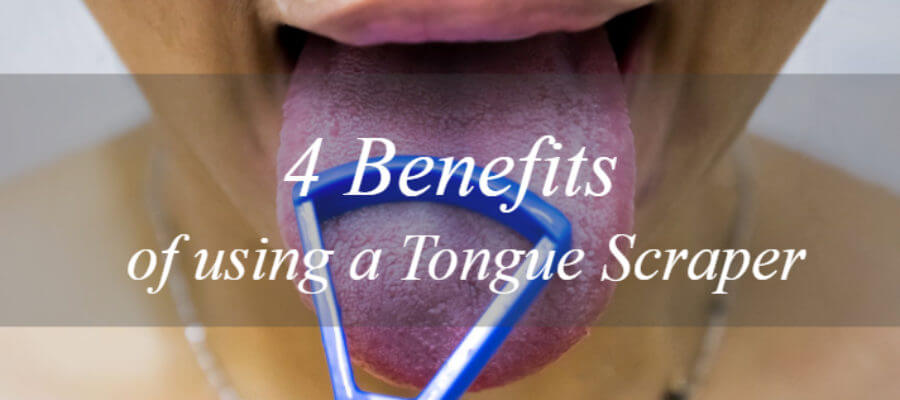A tongue scraper is a tool used to clean the tongue’s surface. Tongue scrapers come in various shapes and sizes, but they all have the same purpose: to remove bacteria and debris from the tongue’s surface. Tongue scraping has been shown to be beneficial for oral health and can help prevent bad breath, tooth decay, and other dental problems. This blog post will discuss the benefits of using a tongue scraper and how to use one properly!
What does a Tongue Scraper do?
This U-shaped device is designed to scrape the top layer of scum from your tongue. They have been used since ancient times and are made of everything from wood to whalebone. Nowadays, they are made of more hygienic material and come in various shapes, sizes, designs, and colors.
Some toothbrushes come with a tongue scraping device on the back of the toothbrush head. You can feel the dips, bumps, and grooves on the back of your toothbrush if it exists. However, using the back of a toothbrush can cause some people to gag and find a scraper more effective.
How do you use a tongue scraper?
Before use, be sure to rinse your tongue scraper. Warm water will easily clear off debris or salvia. Then, apply the tongue scraper using light pressure to the back of your tongue and drag it forward. Then, rinse and repeat. You only need to do this a few times. Make sure to get the sides of your tongue, not just the center. Pressing too hard can cause bleeding and discomfort, so be gentle. It’s easy and quick to incorporate into your morning or evening hygiene routine. Once finished, rinse with a mouthwash of choice for a fresh cleaning feeling.
Who can use one?
Anyone can benefit from removing tongue buildup and harmful bacteria from the mouth. It can be something you use every day or just something to keep in your bathroom to use occasionally. It’s helpful to incorporate into your oral hygiene routine and improve your dental health.
Patients with a gag reflex often use a tongue scraper instead of using their toothbrush head back to brush for tongue cleaning.
Bad Breath Remedy
Do you suffer from bad breath? Your hygienist may recommend a tongue scraper if you have a history of halitosis, a fancy name for bad breath. Bad breath is caused by bacteria that grow on the tongue’s surface. Tongue scraping is one of the best ways to remove these bacteria and prevent bad breath. Tongue scraping is a simple, easy way to improve oral health and eliminate bad breath. It only takes a few seconds each day, and it’s well worth the benefits!
Benefits of Tongue Scraping
The residue on your tongue includes things like the cavity-causing Streptococcus mutans bacterium, fungi, rotting food (that’s not good), and what’s referred to as “volatile sulfur compounds.” In other words, sulfur – that “rotting egg smell.” And of course, taste buds live on your tongue, too!
Here are four benefits of tongue scraping:
- Reduce bad breath – Removing the gunk we discussed above can reduce bad breath.
- Reduce your risk of periodontal disease and cavities by removing leftover food particles
- Improved taste sensation due because of more exposed taste buds
- Make room for good bacteria – Not all bacteria are harmful!
- Prevent heart disease and diabetes – While the debate is still up in the air, some studies suggest there could be a correlation between gum disease, heart disease, and diabetes.
Types of Tongue Scrapers
Metal Tongue Scrapers
Metal tongue scrapers are popular because of their durability and long-term use. They’re great for the environment because you can reuse them for many years without throwing them away. There are stainless steel tongue scrapers, too. These are easy to keep bacteria-free by just sterilizing them in the dishwasher. Copper tongue scapers even have antibacterial properties. They come in small packages of one or two and are fairly inexpensive.
Plastic Tongue Scrapers
There are reusable plastic tongue scrapers and disposable tongue scrapers. Even the back of your toothbrush can often be used as a tongue scraper. You may find these types of tongue scrapers come more in a package than metal ones.
Tongue Discoloration
It is good for people who often have a coated tongue, which means a thin film or layer of dead bacteria on top of their tongue. You can tell if you have a coated tongue because your tongue may look white or discolored. Causes of a coated tongue:
- smoking
- medication
- dry-mouth
- fungal infection
- yeast infections of the mouth
- Bad Bacteria vs Good Bacteria
Millions of bacteria are in your mouth, and not all is bad. Using a tongue scraper is great for getting rid of bad bacteria that cause bad breath. It can also minimize the loss of good bacteria in your mouth, unlike other mouth cleaners like alcoholic mouthwashes such as Listerine.
Harmful bacteria contribute to plaque and tartar on teeth, making them more susceptible to cavities. Bacteria build-up can also lead to inflammation of gum tissue (gingivitis). If left untreated, gingivitis can lead to periodontal disease, which means a more expensive dental visit (plus other unwanted consequences!).
Affordable DIY Tongue Scraper Alternative
Tight on cash? Using a spoon can be a viable replacement option for tongue scapers. Or if you’re like some unorganized people and tend to misplace it, you always have one in your kitchen as an alternative.
Where do I buy one?
Tongue scrapers are relatively inexpensive and can also be found at any local drugstore or Amazon. It doesn’t matter what material, color, or brand – just find the one you like and get scraping!
Thanks for learning more about how to improve your dental care routine. Keep your oral health in check and the hygiene of your mouth pristine with this handy tool! If you have questions or concerns regarding this article, give us a call or talk to your dentist.


